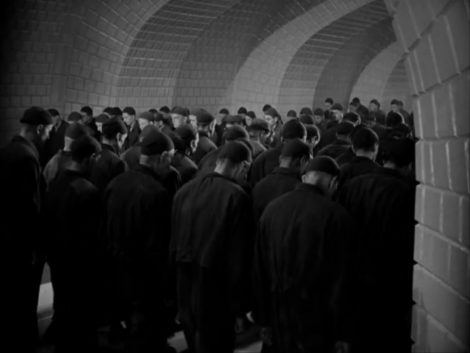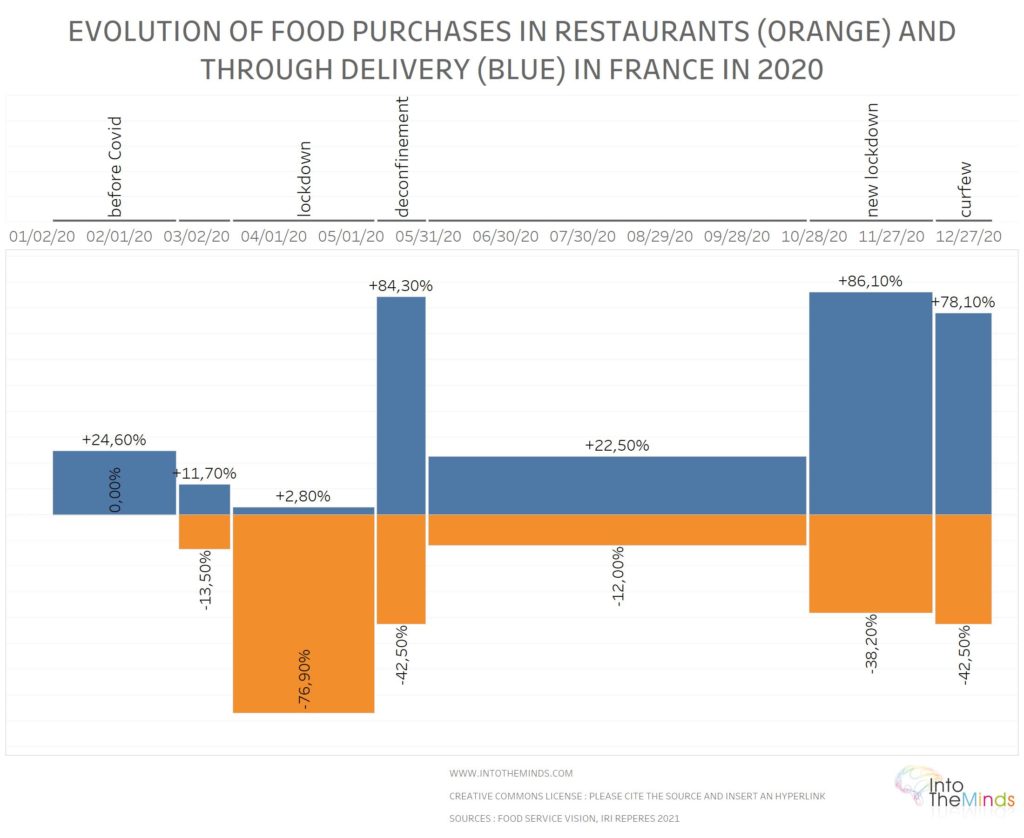For months now, restaurants have been closed because of Covid. Months during which consumers have had time to adopt new habits, including ordering takeaway food. The takeaway will represent 20% of the sector’s turnover and generate up to 10.3 billion Euros within 3 years. This is a profound change that few people perceive at the moment. It shifts towards a more formatted restaurant industry, driven by the star dishes (pizzas, burgers, sushi) that millennials love. This shift will be accompanied by a boom in dark kitchens, the emerging part of a more global phenomenon that I call the “dark economy.”
Summary
- Dark kitchens, the future of catering?
- Advantages of dark kitchens
- Dark kitchens, symbols of our society
- Conclusion
Covid changes the rules: takeaways and deliveries take off
- 46% of French people had food delivered to them in 2020, as opposed to 40% in 2019.
- 50% of purchases are made by regular customers
- Home delivery now also appeals to the 35+ age group
- during the first re-confinement, home deliveries increased by 84.30
- during the second re-confinement, meal deliveries increased by 86.10
- Meal deliveries will represent 20% of sales in 3 years
… and the catering industry collapses
- during the 1st lockdown (April 2020), restaurant purchases (takeaways) collapsed by 76.9%
- the period between 2 waves was the least dramatic (-12%)
Dark kitchens: the future of the catering industry?
French shopping statistics show that meal deliveries boomed dramatically in 2020.
It’s a huge trend. Make no mistake. It’s here to stay. The often-unsuccessful attempts by traditional restaurateurs to do takeaways should not obscure the reality. The growing share of Millennials in the workforce will only reinforce this trend.
In this perspective, dark kitchens could well be the future of meal deliveries and catering.
credits: Shutterstock
Advantages of dark kitchens
I have already discussed several years ago what was, at the time, only a marginal phenomenon, still largely hidden. Dark kitchens have since become a profit-making tool like any other, a business model in its own right.
They have obvious advantages from a financial point of view and are therefore attracting the interest of investors:
- infrastructure costs are reduced thanks to the rationalization of space
- fixed costs are transformed into variable costs: the manager is no longer bound by a long lease or by purchasing a storefront.
- some dark kitchens can be transported closer to the customers
Sushi, pizza, and burgers are the star dishes in takeaways. The appetite for these quickly “industrialized” dishes should strengthen investors’ desire for dark kitchens. The “classic” restaurant owners will be in for a treat. If the latter want to sell in “takeaway” or through deliverymen, a reflection must be initiated on the proposed dishes.
Dark kitchens, symbols of a society that never stops accelerating
Dark kitchens are also indicative of the times in which we live. Let me take a step back and suggest a parallel.

In the film Metropolis (1927), workers work underground to make life possible for their “masters. They power the machines that keep the city running.
Today, an army of “blue-collar” workers also works to feed (literally and figuratively) the “white-collar” workers.
Innovation and digitalization seem to have become the only drivers of the economy. White-collar workers have become the emblem of this. Their work is worth its weight in gold, and we must optimize every minute.
Paradoxically, the confinement has shown that it is possible to work even more. The pace, already crazy, has accelerated even more. The place left for other activities (eating in particular) is bound to be reduced to a minimum. Delivery is becoming a way to be more productive, and I bet the day will come when employers will subsidize home deliveries.
credits: Shutterstock
Conclusion
In the globalized economy at the service of galloping consumerism, there were still shadows. Those of the millions of workers, hidden at the other end of the world, to satisfy Western consumers’ needs. Like in the film Metropolis, these workers moved around in the underground world of globalization.
From now on, there is no need to do everything in secret. The time has come for the advent of an increasingly dehumanized economy. Under the guise of profitability, everything becomes a pretext for the search for efficiency. Your groceries are prepared in “dark stores” and delivered to your doorstep. Your meal is prepared in a “dark kitchen,” a container or a kitchen rented for the occasion. The delivery is made by falsely independent deliverymen, the linchpins of a system that is out of breath.
In an article published a few years ago, I questioned the values of the society in which we live. More than ever, I have doubts. Wouldn’t digitalization, which our political leaders praise, be, in the end, what will cause our downfall?
Posted in Marketing.


